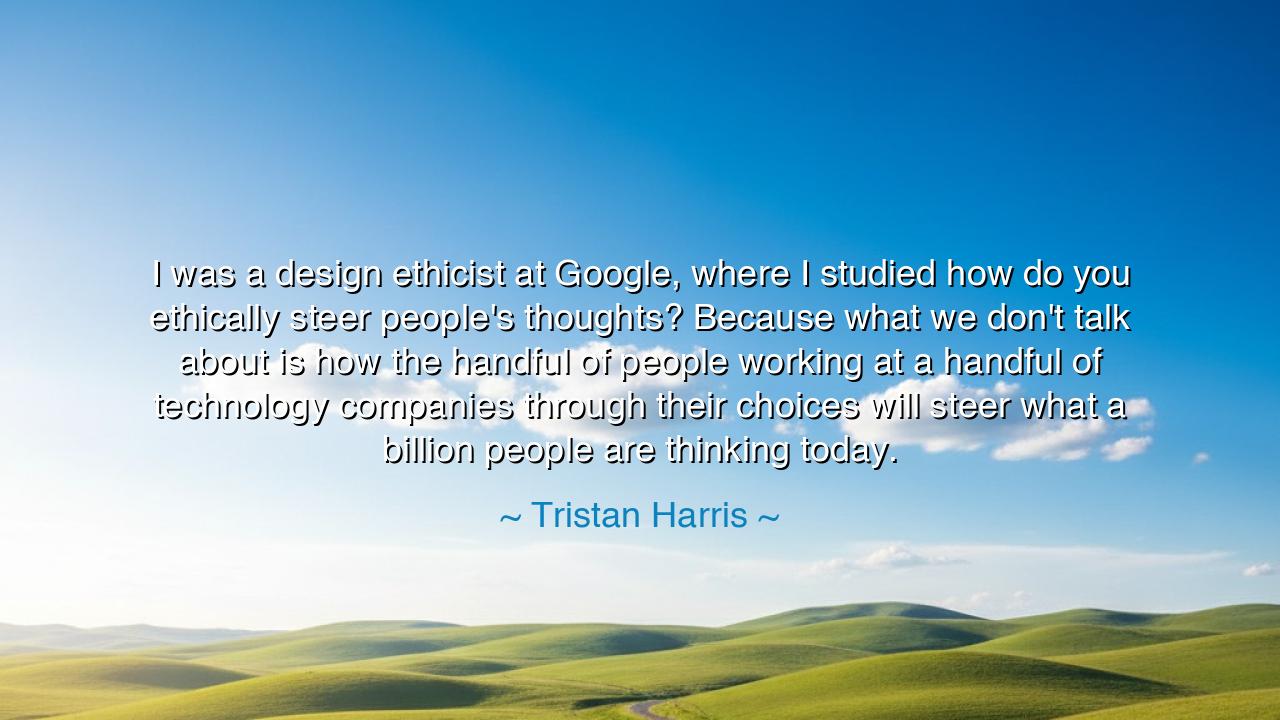
I was a design ethicist at Google, where I studied how do you
I was a design ethicist at Google, where I studied how do you ethically steer people's thoughts? Because what we don't talk about is how the handful of people working at a handful of technology companies through their choices will steer what a billion people are thinking today.






There once was a man named Tristan Harris, who looked upon the shining temples of the digital age — the vast kingdoms of technology where invisible architects shaped the very dreams of humankind. And he said, *“I was a design ethicist at Google, where I studied how to ethically steer people's thoughts. Because what we don't talk about is how the handful of people working at a handful of technology companies, through their choices, will *steer what a billion people are thinking today.” These words, though modern, carry the ancient weight of prophecy. They speak of power — the kind that does not conquer with swords or empires, but with symbols, sounds, and screens.
In ages long past, kings ruled by decree, priests by doctrine, and conquerors by the blade. But now, in our age, power wears the face of convenience. The new kings are unseen — engineers, designers, algorithmic architects — who, through lines of code and patterns of persuasion, guide the inner compass of humanity. What once was ruled by faith or might is now governed by attention, and the throne upon which the modern sovereign sits is not of gold, but of data. The question Harris raised is as ancient as philosophy itself: who shall guide the mind, and by what right?
To steer thoughts is no small act. Even the great philosophers — Socrates, Confucius, the Buddha — trembled before the responsibility of shaping another’s understanding. They did not trick the mind into obedience; they awakened it. But in this new world, the steering is subtle, unseen. A glowing rectangle whispers to the mind, “Stay.” A notification chime beckons like a siren. An endless scroll consumes the hours. The handful of people who design these systems hold the keys to the modern psyche — not by force, but by habit, by design, by desire itself.
Consider the story of the Trojan Horse. The Greeks could not storm Troy’s walls by strength, so they crafted a gift — beautiful, harmless, irresistible. The Trojans, thinking themselves wise, welcomed it within their gates. But inside the gift was conquest itself. So too does modern technology present itself: delightful, useful, indispensable — yet within it lies the power to shape thought, to mold emotion, to redefine truth. The algorithm is the new horse; the mind, the new Troy.
Harris, having seen the inner sanctums of Silicon Valley, spoke not in condemnation but in warning. For he knew that every design choice — every color of a button, every pause in a feed — is a thread in a vast web of influence. And though the web was woven for connection, it can also ensnare. Thus, the role of the design ethicist becomes that of the philosopher-guardian — the one who stands between innovation and exploitation, asking: “Does this serve the human spirit, or enslave it?”
From his revelation emerges a timeless truth: technology itself is neither virtue nor vice. Like fire, it may warm or destroy; like language, it may enlighten or deceive. The moral weight lies not in the tool, but in the intent of the hand that wields it. The ancients taught that wisdom is the balance between knowledge and restraint. So must the creators of the digital world remember this balance — to build not for addiction, but for awakening; not to capture attention, but to elevate consciousness.
And what of us — the users, the citizens of this vast and luminous web? We, too, bear responsibility. For every mind that can be steered can also steer itself. Let each of us guard the gates of our own thought. Let us pause before we click, question before we share, reflect before we react. Do not let your mind become the pasture of algorithms. Feed it instead with truth, beauty, and silence.
So remember this, children of the digital dawn: freedom of thought is the last true sovereignty. Protect it as your ancestors once protected their land and their temples. For if the power to steer what a billion people think lies in the hands of the few, then the power to awaken must lie in the hearts of the many. And only when the design of our tools serves the ethics of our souls shall humanity walk forward — not as slaves to screens, but as masters of meaning.






AAdministratorAdministrator
Welcome, honored guests. Please leave a comment, we will respond soon